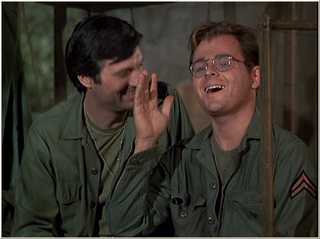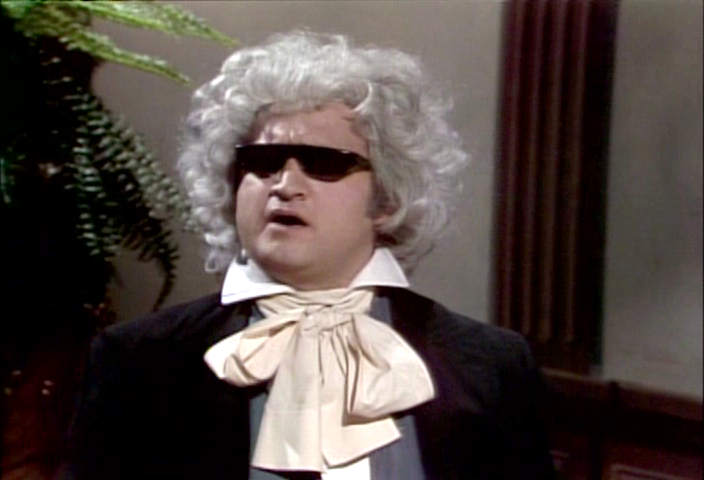
"Ahhh, Bach!"
Posted on 01/27/2015 6:27:10 AM PST by nwrep
The greatest musical genius in the history of the world was born 259 years ago today.
Here is a silent toast to the magical music of Mozart.
From Wikipedia:
He composed over 600 works, many acknowledged as pinnacles of symphonic, concertante, chamber, operatic, and choral music. He is among the most enduringly popular of classical composers, and his influence on subsequent Western art music is profound; Beethoven composed his own early works in the shadow of Mozart, and Joseph Haydn wrote that "posterity will not see such a talent again in 100 years."
Bach’s music is a little too “mechanical” for my tastes. And, I would agree Beethoven was a better writer of music than Mozart. Mozart’s music was written by God.

"Ahhh, Bach!"
My defense of Bach as the true channel of God's musical voice is as follows: I find perfection, intellectually and emotionally in the music of Bach. The music is so perfect that the medium is almost irrelevant. For instance, the first fugue of the WTC can be performed on harpsichord, organ, piano, synthesizer, string quartet, orchestra, choir, chorus and orchestra, kazoo band with a banjo - and with dynamics, without, fast, moderate, slow, and it will still be a miracle of music. It is pure. It is absolute. It is wide open to interpretation. Bach's music belongs to everybody and anybody. And to top it off, J.S. credited God for every composition "SDG" (Soli Deo Gloria).
The music of Mozart, as is the music of almost all other composers, is shackled to the instruments for which it was composed, and in this sense it is not pure and not absolute. and as a consequence, it is grounded to the material world. It is brilliant music for sure. An accomplishment of, and hence, and edifice to, the ego of a man. With God as an afterthought.
Mozart was a lyrical composer; many of his themes from his symphonies, concerti, etc., sound as if they are being sung, Bach was the greatest pure musician/composer ever—IMO. Beethoven put it all together adding emotion to brilliant writing; I think his symphonies pale in comparison to his chamber music.
If the Choral Fantasy is "cliche-addled," what is "Magic Flute?" Mozart himself admitted he was embarrassed by its mediocrity. Besides the Jupiter, name another symphony of Mozart's that compares to Beethoven's Fifth, the Eroica, or even the Pastorale? And then there are the incomparable Beethoven piano works, his superlative Violin Concerto, and pieces like the Egmont Overture, Consecration of the House, and the Seventh.
Mozart wrote plenty of flawed -- and forgettable -- music. He was barely in the same league as Beethoven, and certainly nowhere near his master. Because Beethoven had none.
Ask a musician about Beethoven’s choral writing in the 9th symphony and elsewhere. He had no feel for the human voice. None. His one opera Fidelio has great moments but is not vocally adroit. The Choral Fantasy is a minor work that is virtually never performed. ‘The Magic Flute’ pops up on lists of the greatest operas ever written. Mozart actually revolutionized opera and the concerto. He pretty much invented the piano concerto as it came to be understood. There were no stand alone overtures or programmatic orchestral pieces in Mozart’s time so it’s useless to look for a corollary to stuff like the Egmont and the Consecration of the House. Mozart also gave up writing violin concertii in his teens.
You seem to be putting eras up against each other as opposed to composers. In the 18th century the qualities looked for in music were balance, clarity of line and emotional restraint. Those are the qualities Mozart exhibits. He was also the most radical composer of the 18th century...harmonically much more advanced than Haydn. He’s a utopian composer. His music has an otherworldly beauty that Beethoven hinted at occasionally.
” I would put both Bach and Mozart above Beethoven.”
Bump!
And how can you say on one hand that he excels at those qualities you name as hallmarks of 18th-century classical music -- balance, clarity, and restraint -- and then on the other hand proclaim him "the most radical composer" of the era?
I agree he was more harmonically advanced than Haydn, but that doesn't say much. Haydn is indeed marked by the virtues you listed; his precision is unmatched in the canon. But in deviating from his teacher, Mozart BROKE those traditions; he didn't embody them.
Mozart's music is fun. It's entertaining. It's self-consciously experimental and even challenging at times. But Beethoven captures the music of the spheres. The power and might behind his authoritative, even Teutonic themes are approached only by Wagner and Bach.
Music to Mozart was a toy. Music to Beethoven was an art.
Also keep in mind that Mozart died before turning 36. He did not live long enough to fully develop at a symphonist composer. Only the last 6 symphonies were composed in his maturity...in his time symphonies were mainly a way of making a splash in a new town. He was an operatic composer who wrote piano concertii to make a living, piano sonatas for his students and chamber music for his friends.
The approach to music as an art and a heavenly endeavor was new to Beethoven’s time and Mozart simply would not think that way. No one of his time would. It was a craft to him. The word Art or Artist never occurs in Mozart’s letters. You’re projecting attitudes backwards into a time when they did not exist. Mozart was radical in his harmonic freedom but his music certainly does exhibit the core qualities of the era. Mozart would never start a symphonic work with a terse motif like the opening of Beethoven’s 5th. To Mozart that would be ugly music. A better question would be who is superior to Mozart in the 2nd half of the 18th century? You seem to have a condescending attitude to the music of that time.
NOW you're starting to ask useful questions. And there you might have me. Mozart had few equals during that period, the most likely being Haydn. If you had specified the early half of the century, I might have defended Vivaldi as a challenger, although I would have trouble arguing that he was superior, if indeed even an equal. I also personally like Albinoni and Teleman from that period, but the same caveat applies to them. And Wagner came a little too late to qualify. CPE Bach did some good work during that time, but not of the caliber of Mozart. As did Boccherini, if you like a carryover from the more Baroque period. Even Antonio Salieri produced some notable opi in that time. But I will concede that, limited to the period you describe, Mozart was the luminary.
You seem to have a condescending attitude to the music of that time.
Nonsense. I have great respect for Haydn, and I delight in Mozart. My objection is to the assertion that the latter was the superior of Ludwig Van Beethoven. That is one step short of sacrilege in my book.
Beethoven wrote the music angels whistle on their way to work, and God Himself hums in the shower.
Whenever I hear that music of the angels metaphor I most often hear it applied to Mozart. Beethoven’s music was quite earthy actually - angsty and, in his later period, quite esoteric. It’s hard to call something like the Grosse Fugue, great as it is, music of the angels. Or the vulgar ‘Ode to Joy’ theme which sounds like nothing so much as a German Beer Hall tune. What he does with it is great but the tune itself is very common. Leonard Bernstein used to mock it all the time. Beethoven wasn’t really a melodist.
Wow. The most sublime choral arrangement ever written is "vulgar" and a "beer-hall tune." Your aesthetic needs some severe tuning. Or maybe you've recently received a blow to the head?
Leonard Bernstein used to mock it all the time.
Leonard Bernstein was a tin-eared hack who wasn't fit to copy Beethoven's liner notes. His opinion of the Maestro's music is about as meaningful to me as Michael Moore's.
Beethoven wasn’t really a melodist.
See above comment on your aesthetic. Or maybe you just need new hearing aid batteries.
Bernstein was almost certainly the most gifted musician in American history and a better melodist than Beethoven. Keeping in mind that writing melodies isn’t the end-all be-all of composition. Obviously Beethoven was a greater composer. Tchaikovsky also wrote better melodies than Beethoven but was not a greater composer. The ‘Ode to Joy’ melody, played on a piano without the bombast, is a very, very simple and diatonic tune. There’s nothing remarkable about it at all. Beethoven probably chose the tune because it was so simple and so reflective of *all* of humanity - high and low.

"Tell your ma....tell your pa...gonna send you back to Arkansas..."
Louis Moreau Gottschalk was a better composer than Leonard Bernstein. Hell, Stephen FOSTER was a better composer than that tired old phony. In fact, it's arguable that Frank Zappa or Barry Manilow could out-write Bernstein. If not for the support from his ivory-tower effetes, Bernstein would have spent his career sweeping up Carnegie Hall.
ROTFLMAO
Let your personal feelings effect your judgment much? You clearly disliked the man (and he was often a hard man to like) but that aside...yeah I’m sure Manilow and Foster had a ‘Candide’ and ‘West Side Story’ or Chichester Psalms in them. Leonard Bernstein was...a concert pianist of the first rank - he was a virtuoso pianist actually, a conductor of world class, a composer of high accomplishment and a brilliant educator.
"Candide" is the most overrated musical since "Paint Your Wagon." "West Side Story" was nothing more than a ripoff of "Romeo and Juliet" set to paltry, cheesy melodies.
As to his skill as a conductor, ok, I'll grant that. But he wouldn't have been squat without the NYPhilharmonic playing under his baton. And as far as an "educator," maybe in the sense of "what NOT to do.
Not only does Bernstein not belong in the same pantheon as Beethoven, he shouldn't even be allowed to park cars outside it. If he's the premiere American composer of the century, then that's not so much a compliment as a comment on the sorry state of American classical music.
I assume you'll want to respond to this, but I think I've hijacked enough of this thread. I will conclude by saying that your musical aesthetic and mine are polar opposites.
Who’s comparing him to Beethoven? lol I said American musicians. Bernstein held Beethoven in the highest reverence btw. He merely explained how his greatness is not due to the standard values we use to judge composers.
Candide is a unique hybrid of musical and opera. There’s nothing quite like it. And of course WSS is a musical version of R&J. It endures because Bernstein’s innovative Jazz and Latin inspired music with time signatures never before seen in a musical (and rarely seen since). We’re talking about music only here not the source of a theater piece. Bernstein was a great conductor no matter which orchestra he was working with. I didn’t always groove on his interpretations but they were always interesting. And please tell me how his great Young People’s Concerts or Norton Lectures (where he defended tonal music) could be improved? What did he do wrong with his pedagogical efforts? Who’s done it better since?
This isn’t a thread hijack...it’s on topic with the way these Classical threads usually go.
Disclaimer: Opinions posted on Free Republic are those of the individual posters and do not necessarily represent the opinion of Free Republic or its management. All materials posted herein are protected by copyright law and the exemption for fair use of copyrighted works.